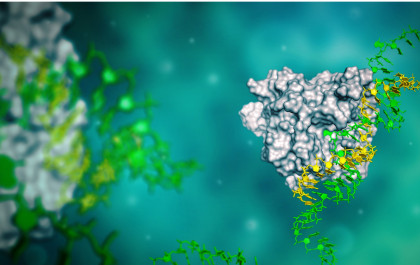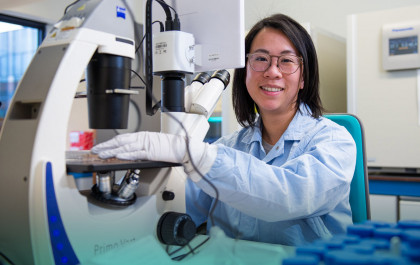ProQR Announces First Patients Dosed in Phase 2/3 Pivotal Trials of QR-421a for USH2A Mediated Retinitis Pigmentosa
LEIDEN, Netherlands & CAMBRIDGE, Mass., Dec. 16, 2021 (GLOBE NEWSWIRE) -- ProQR Therapeutics N.V. (Nasdaq:PRQR), a company dedicated to changing lives through the creation of transformative RNA therapies for genetic eye diseases, today announced the first patients dosed in Phase 2/3 Sirius and Celeste clinical trials of investigational RNA therapy QR-421a for people with USH2A mediated retinitis pigmentosa (RP) and Usher syndrome.
“Retinitis pigmentosa (RP) and Usher syndrome associated with USH2A are inherited retinal diseases that can lead to blindness because there is no treatment available to stop the progressive vision loss”, said David Birch, Ph.D., investigator in the Sirius and Celeste studies at the Retina Foundation of the Southwest in Dallas, Texas, U.S. “These are the first, potentially pivotal trials for these conditions, that we see as a promising milestone that brings hope to the RP and Usher syndrome communities.”
“We are pleased to bring our second RNA therapy into potentially the final stage of clinical testing,” said Aniz Girach, M.D., Chief Medical Officer of ProQR. “In a previous clinical study, QR-421a appeared to be well tolerated and demonstrated concordant benefit in multiple measures of vision in treated eyes compared to untreated. Our goal is that the Sirius and Celeste studies further validate QR-421a’s ability to stabilize vision loss in people with USH2A mediated retinitis pigmentosa and Usher syndrome.”
About the Sirius and Celeste Clinical Trials
Sirius and Celeste, are two double-masked, randomized, sham controlled, 24-month, multiple dose studies to evaluate whether QR-421a is effective at stopping vision loss and whether it is safe and well-tolerated.
Adults and children (age 12 and up) with vision loss due to mutations in exon 13 of the USH2A gene will be enrolled in one of the studies, depending on baseline vision. In both studies participants are randomly assigned to three parallel study arms. In the two treatment arms, participants receive intravitreal injections with QR-421a at different doses (180 μg loading dose and 60 μg maintenance doses or 60 μg loading dose and 60 μg maintenance doses). In the third sham control arm the intravitreal injections are mimicked but no injection or study medication is given.
The Sirius study is planned to enroll 81 participants with advanced vision loss (baseline best corrected visual acuity (BCVA) of worse than 20/40). The primary endpoint in the study is mean change from baseline in BCVA at 18 months in the treated arms compared to the control arm.
The Celeste study is planned to enroll 120 participants with early to moderate vision loss (baseline BCVA of equal or better than 20/40). The primary endpoint in the study is mean change from baseline in static perimetry at 12 months in the treated arms compared to the control arm.
About USH2A Mediated Retinitis Pigmentosa and Usher Syndrome
Usher syndrome is the leading cause of combined deafness and blindness. People with USH2A mediated Usher syndrome are usually born with hearing loss and start to have progressive vision loss during adulthood. The vision loss can also occur without hearing loss in a disease called retinitis pigmentosa. Usher syndrome and retinitis pigmentosa can be caused by mutations in the USH2A gene. To date, there are no pharmaceutical treatments approved for vision loss associated with mutations in USH2A.
About QR-421a
QR-421a is a first-in-class investigational RNA therapy designed to address the underlying cause of vision loss in USH2A mediated retinitis pigmentosa and Usher syndrome due to mutations in exon 13 of the USH2A gene. QR-421a is designed to restore functional usherin protein by using an exon skipping approach. QR-421a is intended to be administered through intravitreal injections in the eye and has been granted orphan drug designation in the US and the European Union and received fast-track and rare pediatric disease designations from the FDA.
About ProQR
ProQR Therapeutics is dedicated to changing lives through the creation of transformative RNA therapies for the treatment of severe genetic rare diseases such as Leber congenital amaurosis 10, Usher syndrome and retinitis pigmentosa. Based on our unique proprietary RNA repair platform technologies we are growing our pipeline with patients and loved ones in mind.
Learn more about ProQR at www.proqr.com.
Forward Looking Statements
This press release contains forward-looking statements. All statements other than statements of historical fact are forward-looking statements, which are often indicated by terms such as "anticipate," "believe," "could," "estimate," "expect," "goal," "intend," "look forward to", "may," "plan," "potential," "predict," "project," "should," "will," "would" and similar expressions. Such forward-looking statements include, but are not limited to, those relating to statements regarding QR-421a and its clinical development and therapeutic potential, including commencement of the Sirius and Celeste trials, trial designs, site locations and timing of results from this trial. Forward-looking statements are based on management's beliefs and assumptions and on information available to management only as of the date of this press release. Our actual results could differ materially from those anticipated in these forward-looking statements for many reasons, including, without limitation, the risks, uncertainties and other factors in our filings made with the Securities and Exchange Commission, including certain sections of our annual report filed on Form 20-F. These risks and uncertainties include, among others, the cost, timing and results of preclinical studies and clinical trials and other development activities by us and our collaborative partners whose operations and activities may be slowed or halted by the COVID-19 pandemic; the likelihood of our clinical programs being executed on timelines provided and reliance on our contract research organizations and predictability of timely enrollment of subjects and patients to advance our clinical trials and maintain their own operations; our reliance on contract manufacturers to supply materials for research and development and the risk of supply interruption from a contract manufacturer; the potential for future data to alter initial and preliminary results of early-stage clinical trials; the unpredictability of the duration and results of the regulatory review of applications or clearances that are necessary to initiate and continue to advance and progress our clinical programs; the ability to secure, maintain and realize the intended benefits of collaborations with partners; the possible impairment of, inability to obtain, and costs to obtain intellectual property rights; possible safety or efficacy concerns that could emerge as new data are generated in research and development; and general business, operational, financial and accounting risks, and risks related to litigation and disputes with third parties. Given these risks, uncertainties and other factors, you should not place undue reliance on these forward-looking statements, and we assume no obligation to update these forward-looking statements, even if new information becomes available in the future, except as required by law.
ProQR Therapeutics N.V.
Investor Contact:
Sarah Kiely
ProQR Therapeutics N.V.
T: +1 617 599 6228
skiely@proqr.com
or
Hans Vitzthum
LifeSci Advisors
T: +1 617 430 7578
hans@lifesciadvisors.com
Media Contact:
Cherilyn Cecchini, MD
LifeSci Communications
T: +1 646 876 5196
ccecchini@lifescicomms.com
Retina Foundation Contact:
Melanie Hoffman
Marketing Communications Director
T: +1 214 336 4533


